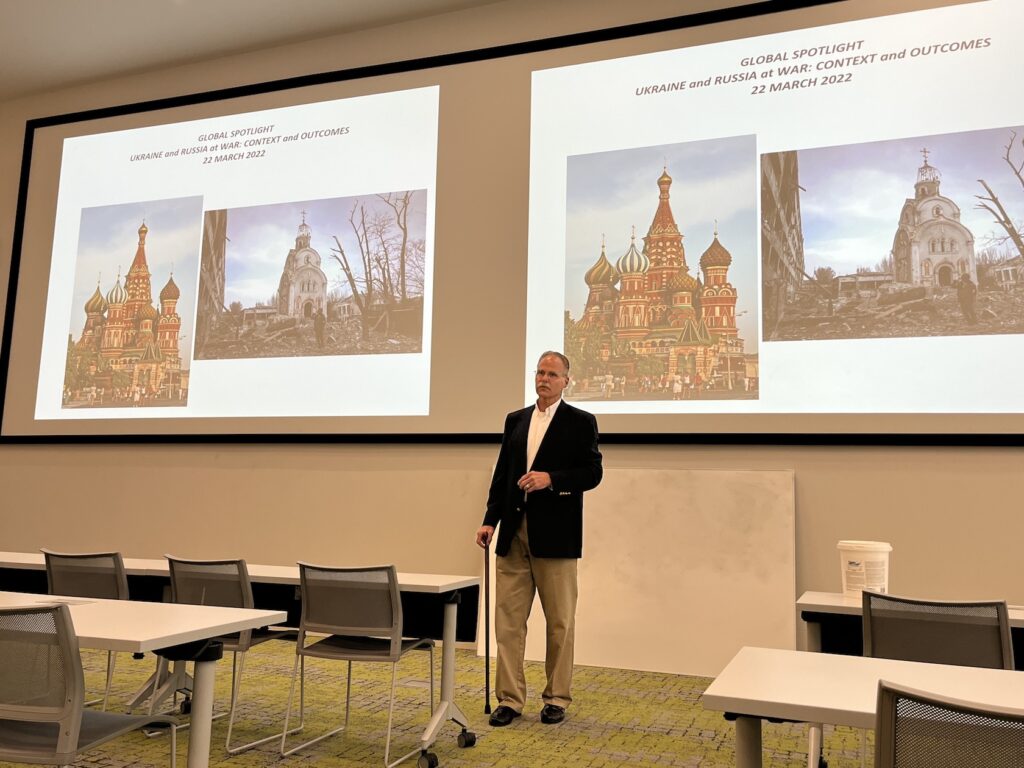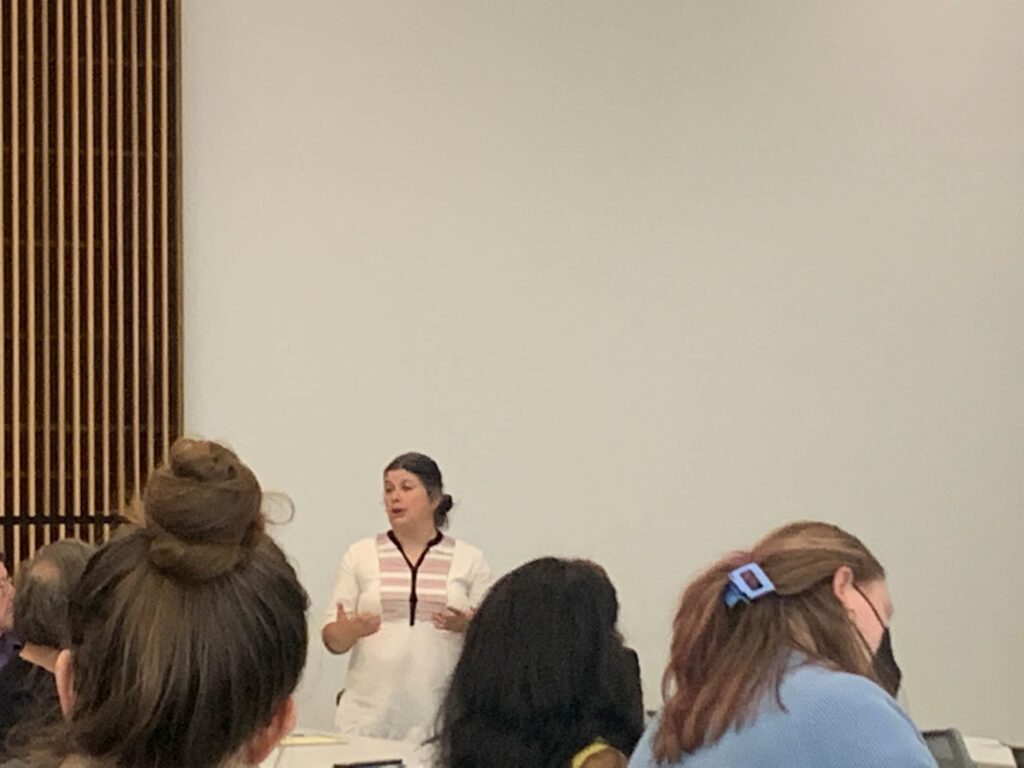Co-written with Madelyn Ricket
“You may not be interested in war, but war is interested in you.”
This unsettling Leon Trotsky quote rings true in times like these. Niall Michelsen, a professor at Western Carolina, used this unsettling quote to reinforce the importance of students being educated on global crises.
The United States is watching the war in Ukraine unfold from the comfort of their homes. Although this is happening far away, four Western Carolina University professors took it upon themselves to bring these events closer to home.
A panel on the Russian invasion of Ukraine took place on March 22 with professors Michelsen, Katerina Spasovska, David Dorondo and Ingrid Bego. It was an in-depth presentation to contextualize recent events and where each panelist gave their predictions on where this war will go.
The panel was the eighth in the Global Spotlight Series from the International Studies program for discussing major world events, starting with the first Russian invasion of Ukraine in 2014. It was interrupted during the pandemic, but was brought back this semester.
“Tragically, coincidentally, our bringing back the Global Spotlight happens to be discussing exactly the same subject with which we began eight years ago,” David Dorondo, a WCU history professor, said.
Dorondo is a NATO energy security consultant, started the panel off by giving geographical and ethnic context. He showed several maps that gave attendees a geographical orientation of the war, something that is hard to get when watching it unfold on a screen.

Dorondo gave an in depth look of where Ukrainian refugees are going to find safety. At the time of the presentation, there were 10 million refugees. Three million had fled with the majority going to Poland. Six million refugees that were internally displaced within Ukraine. This number is increasing daily.
Next, Dorondo went to explain the ethnic complexities in Ukraine. For example, he mentioned how many Ukrainians self identify as ethnically Russian and are native Russian speakers, but identify as Ukrainian in nationality. Many of those who have fled are part of this group.
Ingrid Bego, political science professor and expert in European Union and Eastern European politics, talked about the new world order, what that means, and how it got there.
Bego, who is also originally from Albania, explained how Ukraine had been a very important asset to the Soviet Union. With the falling apart of former USSR in 1991, the people of Ukraine resoundingly voted to become independent from Russia.
Ukraine created a new constitution in 1996 and continued to try to make steps towards being an independent, democratic country.
“There has not been any other people in the region or internationally that have fought Russia’s influence more than Ukrainians,” said Bego.
However, Bego added that the West has not taken their fight seriously.
Bego explained that the European Union (EU) had to decide what to do with countries that had formerly been communist.
The EU decided to enlarge and let the countries join if they met certain criteria: The countries must be democratic, they must take on some responsibilities of the Union, and they must be economically prepared.
These criteria were not only vague, but very difficult for many post-communist countries to achieve, nor were these criterion set for Western countries.
Over the years, many countries met the criteria and were allowed into the EU. But, for Ukraine and countries in the Balkans, the EU stalled the negotiations.
Bego discussed how the EU “promised and promised and promised” membership to these struggling countries. And as of 2021, the EU decided they would most likely never make it in.
This was proven on Feb. 28 when Volodymyr Zelenskyy, the president of Ukraine, signed the application for fast-tracked EU membership, which was struck down.
This hesitation to give Ukraine support has left them vulnerable to Russian influence, something Russian President Vladimir Putin has taken advantage of.
“What we can definitely agree on is that peace in the European continent is over,” said Bego. “They show us the EU was unprepared, once again.”
Bego ended her portion of the panel by stating enlargement of the EU would be a proactive step to defend both Europe and democracy.

Katerina Spasovska, a communication professor and Macedonian native, spoke about the types of media coverage and propaganda happening during the war.
This topic was particularly close to home for Spasovska as she worked as a reporter in the country currently known as North Macedonia while the country broke from former Yugoslavia and moved from communism to a free market in the 1990s. She also referred to the bloody break of Yugoslavia and the war in Bosnia and Croatia.
“The media in wars like this become a weapon, and they kill as much as the military kills,” Spasovska said reminding students of the role of propaganda in media coverage and access to information.
Spasovska explained how the citizens of Russia who only get exposed to state controlled media will get a very different narrative of the war than the rest of the world.
Many journalists were sent to parts of Ukraine and Russia to report what they saw before the war began. However, many of those journalists have left Russia due to a newly created Russian “fake news” law.
This puts many local and international reporters in an even more precarious position. Either they report and risk going to prison for 15 years or they leave Russia and try to report from outside. Many have chosen to cover the war from only the Russian perspective and how it impacts Russian life and they are still not sure how long that can be.
Any journalists that remain in Ukraine are relying more and more on official information from the Ukrainian government, live streams, and social media. As the war intensifies, it gets more difficult to verify information.
Five reporters had been killed at the time of the panel. That number has now risen to 7 according to the Committee to Protect Journalists. The number of Russian journalists killed or detained is unknown.
Michelsen touched on the potential use of nuclear weapons by Russia. There has been a push-pull throughout history of countries using threats of nuclear weapons, but Putin has been the first to say that he will not hesitate to use nuclear weapons if anyone interferes with the invasion.
“The Russians have about a thousand nuclear weapons that if they’re exploded it will be smaller than the bombs that were dropped on Hiroshima and Nagasaki,” Michelsen said.
Michelsen initially believed Russia would dominate Ukraine quickly. But, “to the delight of the world, the Ukrainians have resisted.”
Now, Michelsen thinks the invasion will stay in Ukraine and that other countries will refrain from getting involved to deter Russia from using nuclear weapons.
He does not believe nuclear weapons will end up being used because “nuclear war makes no sense for either side.”
However, he argues, if Ukraine keeps fighting back, Russia may try to raise the level of violence in order to stabilize their power in this war. If they believe they are losing, the natural instinct is to raise the stakes.
Even so, Michelson predicts that Putin, “who has made every mistake in this war,” will make a good call and not escalate the war.
However, as time passes, one can see Russia is raising the stakes and raising the violence. The United Nations is requiring $1.1 billion in order to meet the rising humanitarian needs. The city of Mariupol’ has become a graveyard.
Only time will tell for how this conflict develops, though all the panelists agree, it seems it won’t be over anytime soon.
Related Story: The messiest story you can have: A Western perspective on the war in Ukraine



